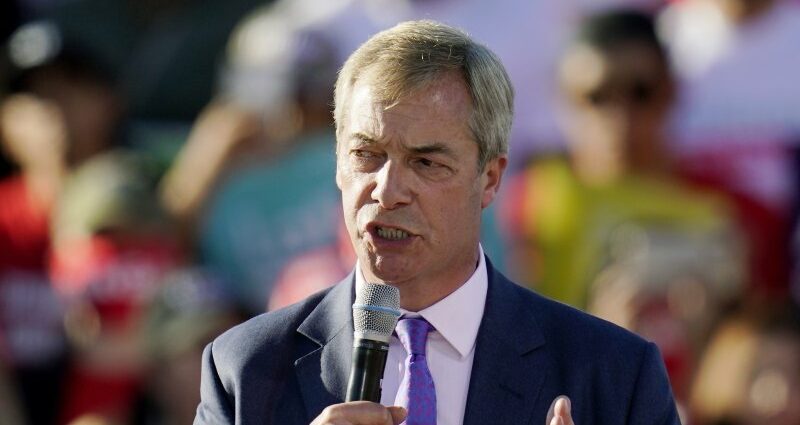Save articles for later
Add articles to your saved list and come back to them any time.
London: Polarising British political figure, Nigel Farage, has received a personal apology from one of the UK’s biggest banks after allegations it closed the leading Brexit antagonist’s account because his views were at odds with the organisation’s corporate values.
The saga has sparked a growing political furore over Farage’s treatment by the private bank Coutts, owned by NatWest Group, whose biggest shareholder has been the UK government since a taxpayer bailout at the height of the 2008 financial crisis.
Controverisal British political figure Nigel Farage has recieved a personal apologise from the boss of one of the UK’s biggest banks.Credit: AP
The scandal has attracted the scrutiny of the financial regulator, and on Thursday prompted the UK Treasury to push out new rules that it says will protect free speech.
The apology from Dame Alison Rose, the bank’s chief executive, came after Farage – the former leader of the UK Independence party and its successor the Brexit party – obtained documents from a Coutts meeting in November last year where “commercial” reasons and “reputational risk” associated with his political views were cited as reasons for considering terminating his account with them.
Farage said the nearly 40-page memo showed that its decision to close his accounts related to his political views, spanning from his support for former US president Donald Trump to controversies linked to Russia and Brexit. It also included 13 of his tweets, which canvassed issues such as the Human Rights Act, the Royal family and tennis great Novak Djokovic.
He said the report also deemed him a “politically exposed person” – a customer who is considered high risk and has more potential to acquire money through illegal means, such as money laundering.
In a letter, Rose apologised to Farage for “deeply inappropriate” comments made about him in the report on his suitability as a customer. She also pledged to personally oversee a full review of processes at Coutts — once known as “the Queen’s bank”.
“I believe very strongly that freedom of expression and access to banking are fundamental to our society,” she wrote. “I fully understand yours and the public’s concern that the processes for bank account closure are not sufficiently transparent.”
Under new measures, published by the UK Treasury on Thursday, banks will be required to give a full explanation when they drop an existing customer. The notice period for a forced account closure will extend from 30 days to 90 days, which it said gives customers more time to challenge the decision through the Financial Ombudsman Service or find a replacement bank.
Andrew Griffith, the economic secretary to the Treasury, said freedom of speech was a cornerstone of our democracy, and it must be respected by all institutions.
“Banks occupy a privileged place in society, and it is right that we fairly balance the rights of banks to act in their commercial interest, with the right for everyone to express themselves freely,” he said.
Coutts, which has not clarified whether Rose was personally involved in the decision, said it did not close down customers’ accounts “solely” because of personal views.
A spokesman said: “We recognise the substantial interest in this case. We cannot comment on the detail given our customer confidentiality obligations. However, it is not Coutts’s policy to close customer accounts solely on the basis of legally held political and personal views.”
Farage, 59, is a former commodities trader and has become a popular television and radio presenter after 20 years as a member of the European Parliament. He had accused his bank of stripping him of his human rights by denying him his accounts.
He said on his nightly television program, on GB News, that the apology was forced by the Treasury and was not genuine.
“In life it is always good to get an apology, so thank you Dame Alison for apologising. What I’ve actually been told quietly, privately, is that you were forced into doing this by the Treasury,” he said.
He said it had been embarrassing to bring the issue into the public domain, but said he would continue to battle the banks on the matter.
“I’m afraid I can’t just walk away from this. I’ve started this, and I’ve got to continue. So thank you for the apology. It’s a start, but it’s no more than that,” he said.
Get a note directly from our foreign correspondents on what’s making headlines around the world. Sign up for the weekly What in the World newsletter here.
Most Viewed in World
From our partners
Source: Read Full Article
-
The Trump Organization and former fixer Michael Cohen settle his lawsuit over unpaid legal bills – The Denver Post
-
Rotherham to become the UK's first ever Children's Capital of Culture
-
AEW star Chris Jericho shares ‘damn good’ physique after ‘dad bod shamed’ at 52
-
Moment woman is knocked off her mobility scooter by giant wave
-
New book claims Harry was turning into 'seedy old roué' before Meghan


